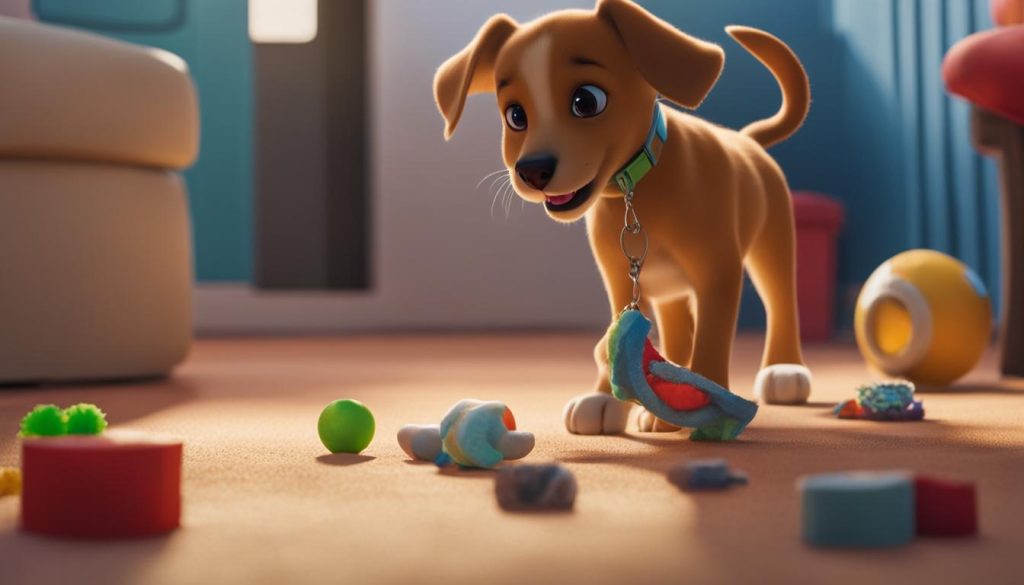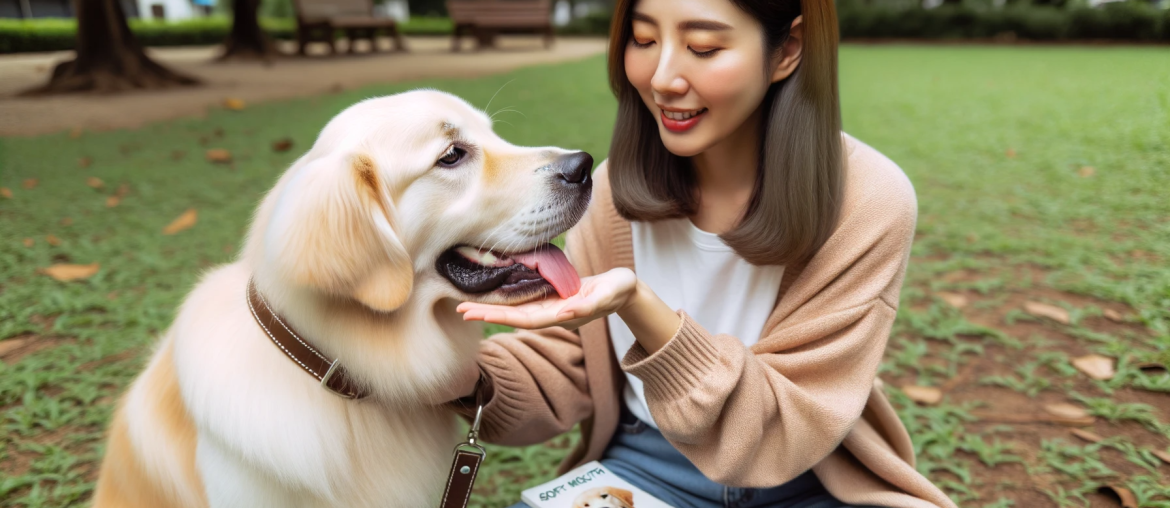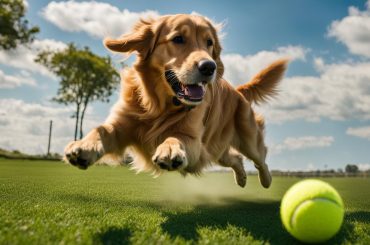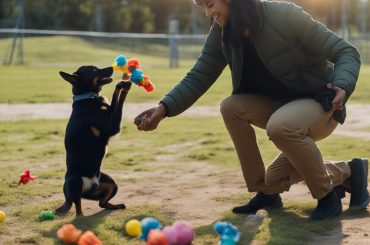Welcome to this guide on training your puppy to have a soft mouth. Teaching your puppy bite inhibition is a fundamental aspect of their development. In this article, I will provide you with essential tips and techniques to help you train your puppy to control their biting and mouthing behavior. By implementing these strategies, you can prevent unwanted nipping and promote gentle touch interactions with your puppy.
Key Takeaways:
- Bite inhibition training is crucial for your puppy’s development.
- Provide appropriate chew toys and redirect their biting behavior.
- Attend a well-run puppy class for socialization and education.
- Teach gentle mouth pressure and reinforce positive behaviors.
- Consistency and patience are essential for successful training.
The Importance of Bite Inhibition Training
Teaching puppies bite inhibition is a crucial aspect of their training. It helps them understand the appropriate level of bite pressure to use during play and interactions with people and other animals. Bite inhibition training is an essential skill because all dogs have the potential to bite, and you should minimize the risk of injury in case of a bite.
Attending a well-run puppy class is a valuable opportunity for puppies to learn and develop their bite inhibition skills. These classes provide a safe environment where puppies can interact with other dogs and engage in play rituals that help them learn bite control. The guidance of experienced trainers in these classes ensures that the training is effective and encourages proper dog education.
By teaching puppies bite inhibition through positive reinforcement and providing appropriate chew toys, we can help them develop a gentle mouth and reduce the likelihood of nipping or biting behavior. You should set boundaries and consistently reinforce the desired behaviors to ensure long-term success in bite inhibition training.
The Importance of Bite Inhibition Training
| Benefits of Bite Inhibition Training | Why Attend a Well-Run Puppy Class? |
|---|---|
| Minimizes the risk of injury in case of a bite | Provides a safe environment for puppies to learn |
| Teaches puppies appropriate bite pressure | Allows puppies to interact with other dogs |
| Reduces the likelihood of nipping or biting behavior | Guidance from experienced trainers |
Bite inhibition training is a valuable skill for puppies to learn as it sets the foundation for proper socialization and behavior around humans and other animals. Through consistent training and positive reinforcement, we can help puppies develop a gentle mouth and ensure a harmonious relationship with their owners and the community.
Understanding the Need for Soft Mouth Training
Puppies naturally explore the world with their mouths, but it is essential to teach them a soft mouth. This training helps them understand that they should not put pressure or cause pain with their teeth when interacting with people or other objects. Soft mouth training is necessary because puppies may not learn this skill from their mother and siblings if they are separated too early. Providing a cue for “no biting” during petting can help reinforce this behavior. It is also important to teach puppies to differentiate between appropriate chew toys and other items, such as hands or furniture.
Teaching puppies to have a soft mouth involves consistent training and positive reinforcement techniques. By setting clear boundaries and using gentle touch, puppies can learn to control the pressure of their bite. You should use positive reinforcement, such as treats or praise, when they exhibit gentle mouth behavior. This helps them understand that having a soft mouth is highly desirable.
To reinforce the concept of a soft mouth, it is recommended to provide appropriate chew toys for puppies to satisfy their natural urge to bite and chew. This helps redirect their attention from biting people or objects that are off-limits. By consistently redirecting their chewing behavior towards appropriate toys, puppies will learn to associate the correct items with their chewing needs, reducing the likelihood of nipping or mouthing.

Benefits of Soft Mouth Training:
- Prevents accidental bites and potential harm to humans and animals
- Builds a strong bond and trust between the puppy and its owner
- Promotes positive behaviors and prevents destructive chewing
- Allows for safe play and interaction with children and other pets
Summary:
Soft mouth training is crucial for puppies to learn bite inhibition and control the pressure of their bite. By teaching them to have a soft mouth, puppies will understand that they should not cause pain or injury when interacting with people or objects. Consistent training, positive reinforcement, and the provision of appropriate chew toys are key elements in teaching a puppy to have a soft mouth. This training not only prevents potential harm but also strengthens the relationship between the puppy and its owner.
Redirecting Your Puppy’s Energy
Puppy nipping is a common behavior that can be frustrating for owners. However, by redirecting your puppy’s energy towards appropriate outlets, you can help curb this behavior. One effective way to redirect your puppy’s energy is by providing plenty of chew toys. These toys not only satisfy their natural urge to chew but also help them relieve stress and keep their jaws busy.
Physical activity is another important aspect of redirecting your puppy’s energy. Engaging in regular exercise such as playing fetch or going for walks can help burn off excess energy and prevent nipping behavior out of excitement or boredom. Incorporating interactive games into their routine can also provide mental stimulation and help tire them out.
To put it simply, consistency is key when redirecting your puppy’s energy. Encourage them to engage with their chew toys and participate in physical activities by offering praise and rewards. This will help them understand what behaviors are acceptable, and over time, they will learn to channel their energy in a positive way.

Table: Recommended Chew Toys for Puppies
| Toy Type | Recommended Brands |
|---|---|
| Rubber chew toys | Kong, Nylabone |
| Plush toys with squeakers | Outward Hound, Chuckit! |
| Rope toys | Benebone, Mammoth |
| Treat-dispensing toys | West Paw, Starmark |
When choosing chew toys for your puppy, consider their size, age, and chewing habits. I recommend that you provide a variety of textures and shapes to keep their interest and prevent boredom. Regularly inspect the toys for any signs of wear or damage and replace them as needed to ensure your puppy’s safety.
The Benefits of Soft Mouth Training
Teaching puppies “soft mouth” rules and commands is a crucial aspect of bite inhibition training. By emphasizing gentle mouth pressure and reinforcing positive behaviors, puppy owners can prevent nipping and promote a safe and harmonious environment. Incorporating basic commands into soft mouth training helps establish clear boundaries and expectations for the puppy.
Using positive reinforcement techniques, such as treats or praise, can be highly effective in teaching puppies to have a soft mouth. When the puppy exhibits gentle mouth behavior, rewarding them immediately with a treat or verbal praise reinforces the desired response. This positive association helps the puppy understand that gentle mouth pressure is preferred.
In addition to commands and positive reinforcement, providing puppies with soft mouth toys can further reinforce the concept of gentle mouth pressure. These toys are specifically designed to be soft and safe for puppies to chew on, allowing them to satisfy their natural urge to bite and explore without causing harm. Incorporating these toys into playtime activities, such as gentle tug-of-war or fetch, teaches the puppy how to control their bite and interact appropriately.
| Benefits of Soft Mouth Training |
|---|
| Prevention of nipping and biting |
| Promotion of a safe and harmonious environment |
| Establishment of clear boundaries and expectations |
| Development of a positive association with gentle mouth behavior |
| Encouragement of appropriate biting behavior through soft mouth toys |
To ensure successful soft mouth training, consistency and patience are essential. Training a puppy takes time, and progress may vary. You should remain consistent in reinforcing desired behaviors and redirecting unwanted nipping. With perseverance and ongoing training, puppies can learn to control their bite and develop a gentle mouth, leading to a stronger bond with their owners and a more enjoyable companionship.

Incorporating Positive Reinforcement
When it comes to training your puppy to have a soft mouth, positive reinforcement is a powerful tool. By using positive reinforcement techniques, you can effectively encourage and reward gentle mouth behavior in your puppy.
One way to incorporate positive reinforcement is through treat rewards. Whenever your puppy displays gentle mouth pressure while interacting with you or playing, reward them with a small treat. This helps reinforce the desired behavior and encourages them to continue using a soft mouth.
In addition to treats, praise and attention are also important forms of positive reinforcement. Whenever your puppy plays nicely or exhibits gentle mouth behavior, provide verbal praise and petting. This positive attention reinforces the idea that gentle mouth behavior is desirable and will lead to more positive interactions.
Consistency is key when incorporating positive reinforcement. Make sure to reward and praise your puppy consistently whenever they exhibit gentle mouth behavior. With time and repetition, your puppy will learn to associate gentle mouth pressure with positive rewards, leading to a soft mouth in their interactions with you and others.

The Power of Positive Reinforcement
“Positive reinforcement is one of the most effective training techniques for teaching puppies to have a soft mouth,” says Dr. Emily Johnson, a renowned dog behaviorist. “By rewarding gentle mouth behavior with treats, praise, and attention, we can shape the way puppies interact and prevent nipping or biting.”
“I recommend that you remember that puppies are still learning and exploring the world with their mouths,” Dr. Johnson explains. “By using positive reinforcement techniques, we can guide them towards appropriate behaviors and teach them the importance of a soft mouth.”
By incorporating positive reinforcement into your puppy’s training, you can effectively teach them to have a gentle mouth and minimize nipping or biting behavior. With patience, consistency, and plenty of positive reinforcement, your puppy will develop into a well-behaved companion.
Addressing Persistent Nipping Behavior
Addressing persistent nipping behavior in puppies requires understanding the underlying causes and implementing effective solutions. One technique that can be used is the opposition reflex. When a puppy tries to nip, gently push your hand into their mouth. This reflexive response will cause them to pull back, teaching them to inhibit their bite. You should mark this behavior with a word like “good easy” and reward the puppy to reinforce the desired response.
However, it is good practice to differentiate between persistent nipping behavior and underlying aggression. If a puppy exhibits aggressive behavior, such as growling, snarling, or biting with intent to harm, it is best to seek professional assistance from a dog behaviorist or trainer. They can provide guidance on how to address the underlying issues and create a safe training plan.
“Addressing persistent nipping behavior requires understanding the underlying causes and implementing effective solutions.”
Additionally, providing puppies with plenty of mental and physical stimulation can help reduce nipping behavior. Engage them in interactive games, such as hide-and-seek or puzzle toys, that challenge their minds and keep them occupied. Regular exercise is also essential for burning off excess energy and preventing boredom-related nipping. Both mental and physical stimulation contribute to a well-rounded training program.
| Opposition Reflex Technique | Benefits |
|---|---|
| Gently push your hand into the puppy’s mouth when they try to nip | Teaches the puppy to inhibit their bite and reduces nipping behavior |
| Mark the behavior with a word like “good easy” and reward the puppy | Reinforces the desired response and encourages positive behavior |
| Seek professional assistance for aggressive behavior | Ensures the safety of both the puppy and those around them |
By addressing persistent nipping behavior early on and providing appropriate guidance and training, puppies can learn to control their mouths and develop into well-behaved companions.

Providing Adequate Exercise and Mental Stimulation
When it comes to training puppies to have a soft mouth, exercise and mental stimulation play a crucial role. Providing puppies with regular exercise helps them burn off excess energy, reducing the likelihood of nipping behavior out of excitement or boredom. A tired puppy is a well-behaved puppy! Engaging in physical activities such as daily walks, playing fetch, or even agility training can help keep your puppy physically active and mentally stimulated.
In addition to exercise, you should provide a variety of toys for your puppy to chew on. This not only helps satisfy their natural urge to chew but also redirects their attention away from nipping inappropriate objects or people. Offering different types of toys, such as plush toys, chew toys, and puzzle toys, can keep their minds engaged and prevent boredom. Try to rotate the toys regularly to keep the novelty factor high and maintain your puppy’s interest.
“A tired puppy is a well-behaved puppy!”
Puppies also crave attention and companionship, so spending quality time with them each day is essential for their overall well-being. Interact with your puppy through playtime, training sessions, and gentle petting to build a strong bond. This social interaction not only provides mental stimulation but also reinforces positive behaviors. Positive reinforcement techniques such as praise and treats can be used to reward your puppy’s good behavior, further strengthening their desire to exhibit gentle mouth behavior.

| Type of Toy | Description |
|---|---|
| Plush Toys | Soft and cuddly toys that puppies can carry around or chew on |
| Chew Toys | Durable toys designed specifically for chewing, helping to redirect chewing behavior |
| Puzzle Toys | Toys that require problem-solving skills to obtain treats, stimulating mental engagement |
In summary, providing adequate exercise and mental stimulation is essential for managing nipping behavior in puppies. Regular exercise, a variety of toys, and quality time spent with your puppy all contribute to their overall well-being and help redirect their energy towards positive behaviors. By incorporating these strategies into your puppy training routine, you can ensure a happier and more well-behaved companion.
Consistency and Patience in Training
When it comes to training puppies to have a soft mouth, consistency and patience are key. Every puppy is different, and training progress may vary. I recommend that you stay consistent in reinforcing desired behaviors and redirecting unwanted nipping. With perseverance and ongoing training, puppies can learn to control their bite and develop a gentle mouth.
Consistency in training means setting clear boundaries and expectations for your puppy. Establishing consistent rules about gentle mouth pressure and appropriate chew toys helps them understand what behaviors are acceptable. Consistent training also involves giving the same cues and rewards for desired behaviors, reinforcing the lessons you are teaching. By consistently reinforcing gentle mouth behavior, your puppy will learn to associate positive outcomes with using their mouth softly.
Patience is another essential element in training a puppy’s soft mouth. It takes time for puppies to understand and learn new behaviors. They may need repetition and reinforcement to fully grasp what is expected of them. I recommend that you remain patient and avoid getting frustrated during the training process. Celebrate small victories and progress, and remember that your puppy is still learning and growing.

Perseverance is key when it comes to bite control progress. Some puppies may pick up soft mouth training quickly, while others may take longer to understand and exhibit the desired behavior consistently. I recommend that you stay committed to the training process, even when faced with challenges. Consistently reinforcing gentle mouth behavior and redirecting nipping will eventually lead to bite control progress.
Training a puppy to have a soft mouth is a journey that requires time, effort, and dedication. By consistently reinforcing desired behaviors, staying patient, and persevering through challenges, you can help your puppy develop into a well-behaved companion with bite control.
The Benefits of Soft Mouth Training
Training your puppy to have a soft mouth comes with numerous benefits that contribute to a strong and positive relationship with your furry companion. By teaching them appropriate bite inhibition and gentle mouth behavior, you can improve their overall behavior and prevent accidental bites that could cause harm.
One of the key benefits of soft mouth training is an improved relationship between you and your puppy. When your puppy learns to control their bite and interact gently, it fosters trust and mutual understanding. This creates a foundation for effective communication and enhances the bond between you and your pet.
In addition to a stronger relationship, soft mouth training also encourages more positive behaviors. By redirecting their energy towards appropriate chew toys and providing mental stimulation, you can help prevent nipping out of excitement or boredom. This promotes a calmer and more well-behaved puppy, creating a harmonious living environment for both of you.

Moreover, soft mouth training reduces the chances of accidental bites causing harm. Puppies naturally explore the world with their mouths, but by teaching them to differentiate between appropriate chew toys and other objects, such as hands or furniture, you minimize the risk of painful bites. This is especially important as your puppy grows older and larger.
Overall, soft mouth training is a valuable investment of time and effort that yields numerous benefits. By following the steps outlined in this article and providing consistent training, positive reinforcement, and appropriate chew toys, you can help your puppy develop into a well-behaved companion, fostering a happy and harmonious relationship.
Final Thoughts
In conclusion, soft mouth training is an essential aspect of puppy training. By teaching puppies bite inhibition and redirecting their energy towards appropriate chewing behaviors, owners can ensure their puppies develop into well-behaved companions. Consistency and patience are key when training puppies, and positive reinforcement techniques such as treats, praise, and attention can greatly enhance the training process.
Soft mouth training not only prevents accidental bites but also promotes a positive and trusting relationship between the owner and the puppy. By setting boundaries and using appropriate chew toys, puppies learn to differentiate between acceptable and unacceptable mouthing behavior. This training also helps puppies understand the importance of gentle mouth pressure and encourages them to interact with people and objects without causing harm.
To put it simply, training progress may vary between puppies, but with perseverance and ongoing training, all puppies can learn to control their bite and develop a gentle mouth. By following the steps outlined in this article, puppy owners can enjoy the benefits of having well-behaved puppies who understand bite inhibition and exhibit positive behaviors. Start training your puppy today, and enjoy a strong bond and a harmonious relationship with your furry friend.
FAQ
Why is bite inhibition training important for puppies?
Bite inhibition training is crucial for puppies’ development as it teaches them about bite pressure and what is acceptable. It helps minimize damage in case of a bite and promotes safe interactions with people and other animals.
How can I teach my puppy to have a soft mouth?
Teaching a soft mouth involves providing appropriate chew toys, setting boundaries, and using positive reinforcement techniques. Training them to be gentle when interacting with people and objects is essential for preventing nipping behavior.
What can I do to redirect my puppy’s energy away from nipping?
Offering plenty of chew toys and providing physical activity, such as playing fetch or interactive games, can help redirect your puppy’s excess energy towards appropriate chewing behaviors. This can reduce the likelihood of nipping out of excitement or boredom.
How can I incorporate positive reinforcement in soft mouth training?
Positive reinforcement involves rewarding your puppy with treats or toys when they exhibit gentle mouth pressure. Praising and providing attention when they play nicely can also reinforce positive behavior. Consistency and patience are key when using positive reinforcement in training.
What should I do if my puppy’s nipping behavior persists?
If your puppy’s nipping behavior persists, you can use the opposition reflex technique by pushing your hand into their mouth when they try to nip. This creates a reflexive response that discourages nipping. However, if your puppy exhibits aggressive behavior, it is best to seek professional assistance.
How can I provide adequate exercise and mental stimulation for my puppy?
Regular exercise, such as walks or playtime, helps burn off excess energy and keeps puppies engaged. Providing a variety of toys for chewing, shaking, carrying, and tugging can keep their minds occupied. Spending quality time with your puppy each day is also essential for their overall well-being.
How important is consistency and patience in soft mouth training?
Consistency and patience are key when training puppies to have a soft mouth. Training takes time, and progress may vary between puppies. You should remain consistent in reinforcing desired behaviors and redirecting unwanted nipping. With perseverance and ongoing training, puppies can learn to control their bite and develop a gentle mouth.
What are the benefits of soft mouth training?
Soft mouth training benefits both the puppy and the owner. It helps build a strong and positive relationship based on trust and mutual understanding. Soft mouth training also encourages more positive behaviors and reduces the chances of accidental bites causing harm.






